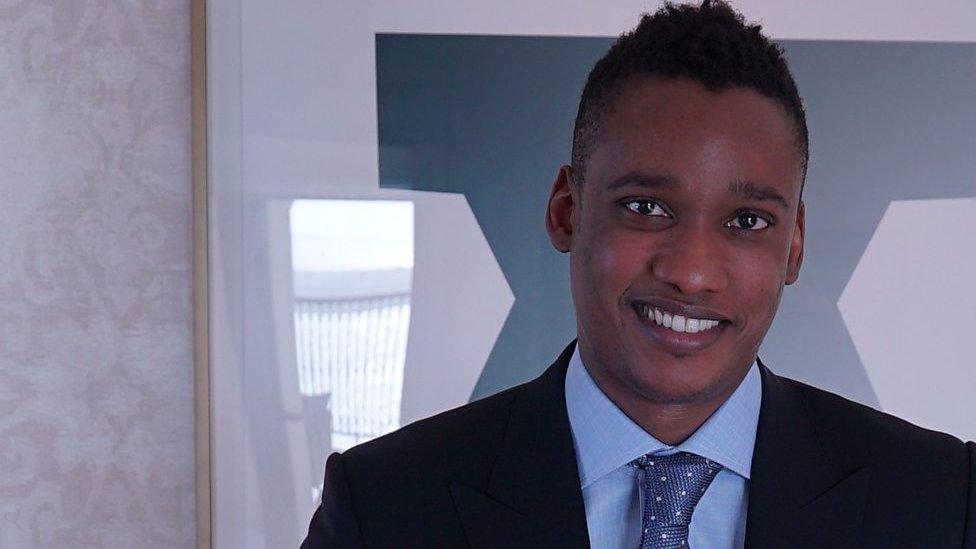South Africa's Jacob Zuma denies being 'king' of corruption
- Published
Jacob Zuma: I have been vilified
South Africa's former President Jacob Zuma has told a judge-led inquiry that allegations of corruption against him were a "conspiracy" aimed at removing him from the political scene.
He was appearing for the first time at the inquiry, which is investigating allegations that he oversaw a web of corruption during his term in office.
His supporters cheered when he entered the building.
Mr Zuma, 77, was forced to resign as president in February 2018.
He was replaced by his then deputy Cyril Ramaphosa, who promised to tackle corruption in South Africa. Mr Ramaphosa described Mr Zuma's nine years in office as "wasted".
The allegations against Mr Zuma focus on his relationship with the controversial Gupta family, which was accused of influencing cabinet appointments and winning lucrative state tenders through corruption.
He has also been accused of taking bribes from logistics firm Bosasa, run by the Watson family.
They all deny allegations of wrongdoing.
"I have been vilified, alleged to be the king of corrupt people," Mr Zuma told the inquiry led by Judge Ray Zondo.
"I have been given every other name and I have never responded to those issues," he added.
Zuma on the 'conspiracy' against him
He lashed out, in detail - and with fury - at what he said was a decades-long conspiracy against him.
He implied that the UK and US had been - and still were - part of an elaborate plot to discredit him, even as he tried to bring about political and economic change in South Africa.
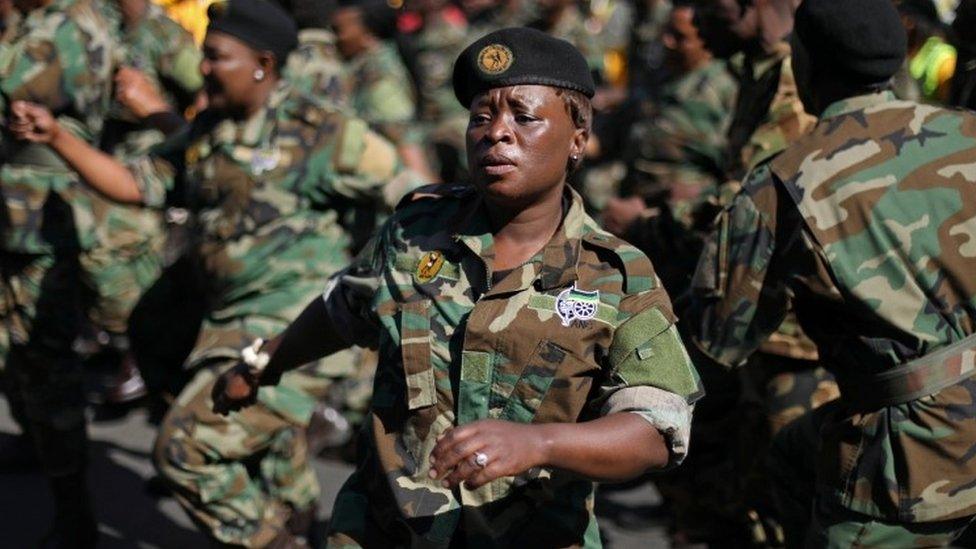
Some of Mr Zuma's supporters came to the inquiry dressed in military uniforms
Mr Zuma alleged that former government minister Ngoako Ramatlhodi, who gave damning evidence against him, was part of the plot.
Other foreign trained agents had tried to poison him, Mr Zuma said, without naming them.
In an interview with South Africa's privately owned News24 website, Mr Ramatlhodi denied being a spy, external.
He was prepared to undergo a lie detector test, and would challenge Mr Zuma to do likewise.
On the eve of the hearing Mr Zuma was in a good mood. He tweeted a video of himself laughing at the chant "Zuma must fall!"
Allow X content?
This article contains content provided by X. We ask for your permission before anything is loaded, as they may be using cookies and other technologies. You may want to read X’s cookie policy, external and privacy policy, external before accepting. To view this content choose ‘accept and continue’.

Zuma on the Gupta family
He said he found the Indian-born family "very friendly".
"I never did anything with them unlawfully. They just remained friends, as they were friends to everybody else," Mr Zuma said, adding that they had also been friends of former presidents Nelson Mandela and Thabo Mbeki.
He objected to allegations that he had allowed the state to be "captured" by the family, and had auctioned the country.
"Did I auction Table Mountain? Did I auction Johannesburg?" he said.

Threat of shockwave revelations

One thing is clear from Mr Zuma's testimony so far - if he is to go down, he will not do so alone. He painted a picture of an alleged conspiracy dating back more than two decades to destroy him.
"I have been provoked," he said, as he threatened to name alleged spies who betrayed the struggle for the freedom of black people in South Africa, and who were allegedly still conspiring against him.
Mr Zuma was once the intelligence chief of the African National National Congress (ANC), the former liberation movement which has been in power since the end of white minority rule in 1994.
So if he honours his threat to tell all, it will send shockwaves across South Africa, and lead to bitter recriminations in the ANC.
But once the dust settles, South Africans will still want to know whether he betrayed his oath of office after he became president in 2009 by being involved in corruption on a grand scale.
That is what the commission is trying to find out - and Mr Zuma is in a fight for his political survival.

How did 'state capture' operate in South Africa?
Many of the revelations from the inquiry concern the relationship between two families - the Zumas, centred on the former president, and the Guptas, three Indian-born brothers who moved to South Africa after the fall of apartheid.
The two families became so closely linked that a joint term was coined for them - the "Zuptas".
The Guptas owned a portfolio of companies that enjoyed lucrative contracts with South African government departments and state-owned conglomerates. They also employed several Zuma family members - including the president's son, Duduzane - in senior positions.
According to testimony heard at the inquiry, the Guptas went to great lengths to influence their most important client, the South African state.
Public officials responsible for various state bodies say they were directly instructed by the Guptas to take decisions that would advance the brothers' business interests.
It is alleged that compliance was rewarded with money and promotion, while disobedience was punished with dismissal.
- Published15 July 2019
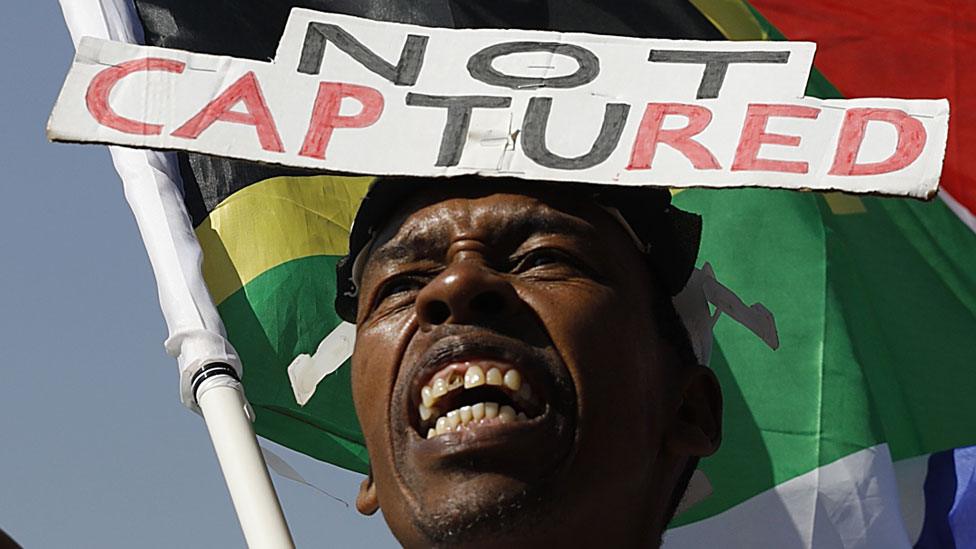
- Published14 February 2018
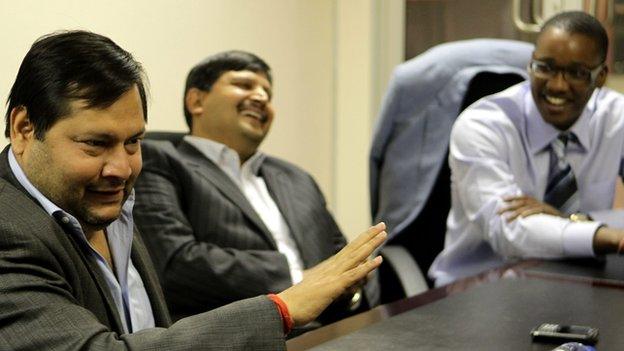
- Published9 October 2017
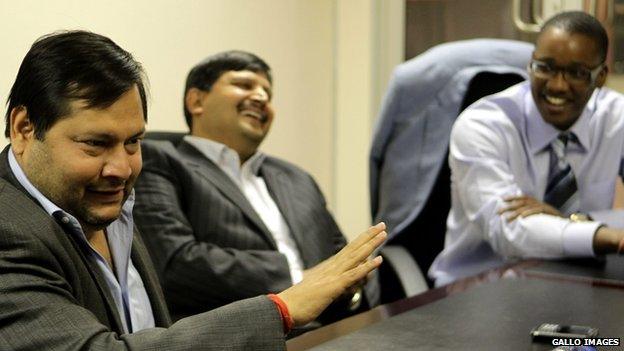
- Published31 August 2017
